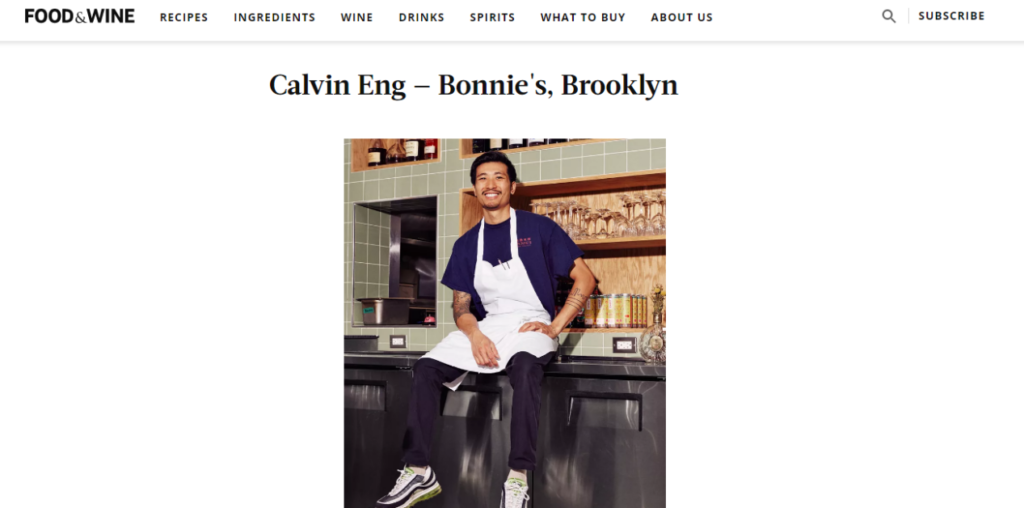Calvin Eng, the proud owner of New York’s Cantonese-American restaurant, Bonnie’s, wears his adoration for Monosodium glutamate like a badge of honour! He even tattooed his bicep “MSG”, not to mention a namesake cocktail on the menu – the MSG Martini!
“Things just taste better with MSG, whether it’s Western or Cantonese food,” the culinary maestro shares with CNN.
“We use it in drinks. We use it in desserts. We use it in savoury food. It’s in almost everything. Salt, sugar and MSG – I always joke that they’re the Chinese Trinity of seasonings.”
By acknowledging and embracing the use of MSG – a strategy that once spelt doom for any eatery – Bonnie’s has emerged as a gastronomical powerhouse. Since it opened its doors in Williamsburg, Brooklyn, in 2021, it’s been one of New York’s go-to spots, bagging several “Best New Restaurant” awards from varied media giants. Eng debuted on the prestigious Forbes 30 under 30 lists in 2023 to highlight a few of his commendable feats.

Did you know? Eng himself has been basking in the limelight, crowned as one of the top new chefs of 2022 by Food and Wine Magazine!

The Story Of MSG
Ever wonder why your tastebuds go crazy over certain savoury dishes? It all started in 1907 when Japanese scientist Kikunae Ikeda decided to investigate. He boiled an insane amount of kombu seaweed to extract a single substance – glutamate, the secret behind the delightful, lingering savoury flavour of dishes like dashi broth!
Does “umami” sound familiar? That’s the name Ikeda gave to this unique taste. Recently, it’s been crowned as “the fifth flavour,” joining the esteemed ranks of sweet, sour, salty, and bitter, often characterized as savoury. Ikeda crystallized the umami essence into what we know as MSG, a versatile seasoning akin to salt and sugar.
In a twist of fate in 1908, enterprising businessman Saburosuke Suzuki purchased a stake in the MSG patent. He established Ajinomoto with Ikeda, a company dedicated to MSG production. MSG took little time to rise in fame, sweeping awards and becoming a kitchen staple, particularly among middle-class homemakers in Japan.
Fast forward a few decades, and MSG has become a global sensation.
Did you know the U.S. military hosted the inaugural MSG symposium post-World War II? The objective was to explore ways to spice up bland field rations with MSG, hoping to lift soldiers’ spirits.
But then came 1968, a year that proved disastrous for MSG. First, a U.S. doctor penned a letter to a medical journal, dubbing it the “Chinese Restaurant Syndrome.”
The letter detailed symptoms such as “a neck-numbing sensation,” “general frailty,” and “heartbeat irregularities.” He suggested that MSG, alongside other ingredients like cooking wine and high sodium levels, might be the culprits.
MSG took the most brutal hit; its reputation was marred for decades due to that letter’s global impact. As a result, many eateries openly committed to an MSG-free menu.
Food and drink P.R. folks dodged any MSG discussions. Feeling unwell after eating? MSG was instantly blamed!
Change In Perception.
Did you know MSG originates from plants?” queries Tia Rains, a Chicago-based nutritionist and Ajinomoto’s V.P. of Customer Engagement. MSG production, she explains, is a fermentation process similar to brewing beer or crafting yoghurt.
To create MSG, sugary plants like sugarcane or corn are fermented, producing glutamate, a vital amino acid in food and our bodies. Add sodium to the mix, crystallize the glutamate, and voila! You’ve got the salt-like MSG found on grocery store shelves!
Surprisingly, you’re likely using glutamate, inosinate, and guanylate in your cooking without knowing it! Ever wondered how some dishes pack such a powerful umami punch? Foods like carrots and onions enhance the umami flavour of beef! Even everyday foods like tomatoes and cheese contain natural glutamate!
“MSG isn’t an allergen, so it doesn’t cause allergic reactions,” asserts Rains in response to claims of ill effects after consuming Chinese food.
Despite ongoing accusations, extensive scientific trials haven’t substantiated MSG sensitivity.
Did you know that global authorities, including the US FDA, have declared MSG safe for consumption?

Still, negative perceptions about MSG persist, keeping Ajinomoto’s marketing team on their toes as they strive to alter attitudes.
In a significant win, Ajinomoto succeeded in getting Merriam-Webster to amend the definition of “Chinese Restaurant Syndrome” in 2020. They also regularly host symposiums to spread awareness about MSG and umami.
Conclusion: Eng’s “zyu zai” dish quickly became Bonnie’s bestseller, echoing his vision of revolutionizing approachable Cantonese cuisine. As MSG’s reputation improves in the U.S., Rains hopes it influences global attitudes!
